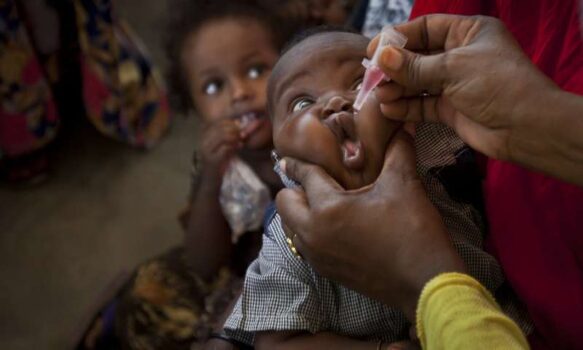 The World Health Organization has certified that Africa is now free from cases of wild polio, as global efforts to completely eradicate the virus continue to move in the right direction. Currently, only two countries in the world namely Afghanistan and Pakistan still report cases of polio.
The World Health Organization has certified that Africa is now free from cases of wild polio, as global efforts to completely eradicate the virus continue to move in the right direction. Currently, only two countries in the world namely Afghanistan and Pakistan still report cases of polio.
On Tuesday, the Africa Regional Committee for Certification (ARCC), an independent regional body set up by the WHO, concluded that the transmission of the wild poliovirus strain has been interrupted in all 47 countries of the WHO African Region.
This was contained in a Press release jointly authored by the WHO Director-General, Dr. Tedros Adhanom Ghebreyesus; and President of Rotary International, Holger Knaack.
The statement titled, ‘Creating a great polio legacy in the African region’, reads in part, “Delivering polio vaccines to every child in the African region and wiping out the wild virus is no small feat and the human resources, skills, and experience gained in the process leaves behind a legacy in how to tackle diseases and reach the poorest and most marginalized communities with life-saving services.
“Leadership from all levels of government across party lines, a historic public-private partnership that raised billions, millions of health workers reaching children across the region – from conflict zones to remote areas only accessible by motorbike or helicopter – and a culture of continual improvement were all critical to overcoming challenges and bottlenecks.
“As countries work to suppress COVID-19, many of the same basic traditional public health methods used in polio eradication, including contact tracing and surveillance, are key to breaking the chains of transmission and saving lives and livelihoods from the first coronavirus pandemic in human history.
“As recently as 2012 half of all globally recorded cases of wild poliovirus were in Nigeria, the final country in the region to rid the virus from its borders. However, as with the COVID-19 pandemic, the lesson is that it’s never too late to turn a disease outbreak around. Through hard work, new innovations and ensuring that no child was missed, Nigeria and the entire African region have now defeated polio.
“Across the region, health workers go village-to-village and door-to-door vaccinating children multiple times and offering health advice and support to the community. It’s a remarkable effort started by Rotary International, which in the 1980s – when there were hundreds of thousands of cases every year – made a global call for eradication.
Polio, a crippling and potentially fatal infectious disease, has no cure but can be prevented by the administration of a vaccine. It is typically transmitted through contaminated water and usually affects children under five, sometimes leading to irreversible paralysis.

Police Quell Clashes In Ile-Epo, Arrest Over 50 Suspects And Uncover Drug Den
Federal Government Declares May 1st, 2024 As Public Holiday For Workers’ Day
JAMB Releases 2024 UTME Results Following Rigorous Scrutiny
Edo State Governor Approves N70,000 Minimum Wage For Civil Servants